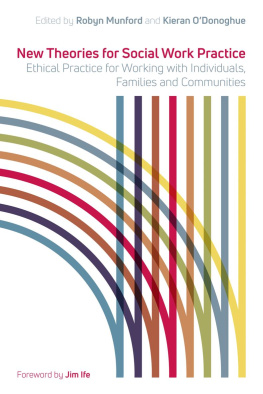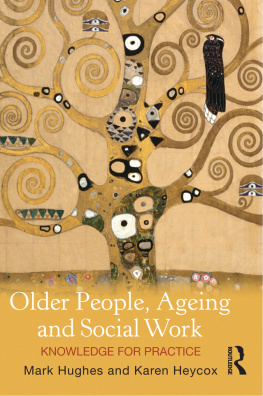Social Work Practice with Older People
SAGE has been part of the global academic community since 1965, supporting high quality research and learning that transforms society and our understanding of individuals, groups and cultures. SAGE is the independent, innovative, natural home for authors, editors and societies who share our commitment and passion for the social sciences.
Find out more at: www.sagepublications.com
Social Work Practice with Older People
[A Positive Person-Centred Approach]

- Los Angeles
- London
- New Delhi
- Singapore
- Washington DC
SAGE Publications Ltd
1 Olivers Yard
55 City Road
London EC1Y 1SP
SAGE Publications Inc.
2455 Teller Road
Thousand Oaks, California 91320
SAGE Publications India Pvt. Ltd.
B 1/I 1 Mohan Cooperative Industrial Area
Mathura Road
New Delhi 110 044
SAGE Publications Asia-Pacific Pte. Ltd.
3 Church Street
#10-04 Samsung Hub
Singapore 049483
Rory Lynch 2014
First published 2014
Apart from any fair dealing for the purposes of research or private study, or criticism or review, as permitted under the Copyright, Designs and Patents Act, 1988, this publication may be reproduced, stored or transmitted in any form, or by any means, only with the prior permission in writing of the publishers, or in the case of reprographic reproduction, in accordance with the terms of licences issued by the Copyright Licensing Agency. Enquiries concerning reproduction outside those terms should be sent to the publishers.
Library of Congress Control Number: 2012954789
British Library Cataloguing in Publication data
A catalogue record for this book is available from the British Library
ISBN 978-1-4462-0183-1
ISBN 978-1-4462-0184-8 (pbk)
Editor: Alice Oven
Assistant editor: Emma Milman
Production editor: Katie Forsythe
Copyeditor: Jane Fricker
Proofreader: Bryan Campbell
Indexer: Elske Janssen
Marketing manager: Tamara Navaratnam
Cover design: Jen Crisp
Typeset by: C&M Digitals (P) Ltd, Chennai, India
Printed in India at Replika Press Pvt Ltd

SAGE
- Los Angeles
- London
- New Delhi
- Singapore
- Washington DC
In memory of Diarmuid Lynch
About the Author
Rory Lynchis a lecturer in social work at Robert Gordon University, Aberdeen. He comes from St. Johnston, County Donegal in the Irish Republic and has lived and worked in Aberdeen for forty years. During this time he has developed and worked in a range of agencies from single homelessness, substance misuse and latterly mental health services. He has published on a variety of themes related to older people including sociology and social work; need, risk and protection and social policy for social work within a Scottish perspective.Rory currently teaches within the School of Applied Social Studies with a specific remit for coordinating the teaching on older people and social work across a range of courses but specifically on undergraduate courses. He also teaches human growth and behaviour within the university on undergraduate and distance learning courses and has a specific interest in object relations. He is currently in the process of developing a user-friendly text on this subject for social work students.
Introduction
The structure of this book is very much driven by some of the radical changes that have taken place within community-based support, care management, the political context and more recent downturns within the economy of the United Kingdom. The book also sets out to explore and define the nature of modern social work training within the recent Professional Capabilities Framework for Social Work and the impact this has on training and service delivery. Just as importantly, the text seeks to focus on those ethical and value-driven aspects of working with older people. While the author would not support the view that values and ethics of themselves are under attack in the modern world, it is true that financial and resource stressors will impact on service delivery and how the needs of older people are met. Most of the chapters of the book will focus on these themes and a consideration of what it is to be an older person in the twenty-first century. This book will appear at a time when there are real concerns as to how older people, without adequate resources, will manage in areas of nutrition, heating and a wider social engagement with families and local communities. Students of Maslow (1987) may wonder what the wider implications for personhood and belonging are when the basics of human existence may be under threat for some individuals. The text is permeated throughout by case studies, exercises and questions to ponder.
The author has also attempted here to define the changing nature of the older person and focuses on this within the context of the transition of growing into older age with an emphasis on law and policy. This is as opposed to youthfulness, which is more readily grown out of. The chapter addresses how older people may become hidden in full view where expressed needs are denied or not acknowledged. Older people may become increasingly worried about their perceived lack of input into society. This is particularly at odds with those older people who are still working post-retirement as well as carrying out voluntary, caring and kinship roles. Lord Birchard, former head of the benefits agency, has not helped the current debate by suggesting that retired individuals should commit to community services to reduce the burden on the state, or have their state pensions reduced (Morris, 2012). A starting premise therefore for any consideration of social work with older people is that older people are not an adjunct to the state but are the state itself. When this politically driven premise is considered as a rational debate as opposed to a consideration of the lack of resources, then older people may have cause to worry. From a social policy perspective this has to be considered within the context of the UKs gross domestic product (GDP), which is one of the highest in Western Europe.
is concerned with values and ethics and how social work practice can remain professional and moral within what is considered the rightness of actions. These considerations may be at a time when resources are limited and practitioners may be forced to make decisions based on this premise. Essentially, this chapter is related to need and its resolution within a context of inclusivity and engagement. The chapter seeks to explore those wider dimensions of personal values as well as a consideration of that more philosophical aspect of what it is to be. The author suggests that without this consideration the needs of all vulnerable groups may not be met. This chapter also considers something of the tyranny of youth, although caution needs to be exercised here to ensure that youthfulness and older age are not seen as conflicting opposites. This is more related to a mutuality of respect and an acknowledgement of the psychological forces at work across the life course. These are not only stages that need to be worked through but hopefully in a collaborative way.











